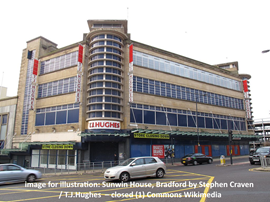Charging for Listed Building Consent pre-application advice
This article was created by The Institute of Historic Building Conservation (IHBC). It was written by Bob Kindred MBE BA IHBC MRTPI IHBC and first published in Jan 2015. You can see the original on the IHBC website.
Executive Summary
Charging for Listed Building Consent [LBC] pre-application advice is far from universal but the extent and range of charging practices of local planning authorities in England appear not to have been comprehensively examined until now. The fee categories and structures of all English local planning authorities have recently been analysed via their publicly accessible web pages in an attempt to provide better understanding of current practice.
Although charging for pre-application planning advice is now widespread, only about one-third of councils in England charge for pre-application listed building advice. This varies considerably in the range and complexity of the advice offered and who in the authority supplies it.
While a frequently stated aim is to cover at least part of the operational costs of heritage related development management; in practice in many instances it seems highly unlikely that the fees levied will provide anything more than a nominal contribution relative to the number of listed building entries on the authority’s statutory list [1] and the number of listed building consent applications in a year that might reasonably be expected to be submitted as a result of pre-application advice.
Typical levels of charging do not appear likely to contribute significantly to offsetting the expenditure on other parts of what should amount to a well-rounded heritage management service, including workload items such as the appraisal and management of conservation areas or the checking of compliance and quality assurance for completed schemes.
As authorities rarely define the costs of a balanced service - beyond standard establishment costs – in advance of the introduction of pre-application charging; assumptions concerning potentially increased income derived from such fees for advice on listed buildings is rarely based on a reliable baseline from which the effectiveness of the charges can be assessed.
Introduction
The principle and practice of charging for pre-application advice on proposals affecting listed buildings varies widely. For some heritage management professionals in local government the principle is anathema given the acknowledged burden already placed upon private individuals in particular applicants as custodians of much of the nation’s heritage, as it is they who face additional financial and regulatory burdens above and beyond those of other ‘ordinary’ owners and occupiers.
A countervailing view advanced by other professionals, service managers and councillors is that charging for pre-application heritage advice is a natural extension of the existing regime applied to planning proposals. Furthermore the continuing pressure on local government finance and the objective of covering (at least in part) the operational costs of providing professional planning-related advice has already seen either the wide introduction of charging or a curtailment of specialist conservation services or both. Consequently there is now a growing expectation that many of the professional services within local government that were once freely available on demand will now need to be rationed and/or can no longer be expected to be provided free of charge.
Charging for pre-application advice is usually seen within the context of the administration of the planning service as a whole. It is rarely seen within the context of what might generally be considered a balanced good practice service across a range of specialist conservation functions. [2]
The development management system is predicated on short-term goals related to speed of the delivery rather than the wider, longer-term community benefits to the local historic environment such as conservation area characterisation and management or the satisfactory resolution of heritage at risk issues. Valuable heritage management tasks such as these require the consistent application of scarce resources over the long-term to be successful and do not generate fee income.
2014 survey and methodology
Potential applicants and the general public should have a reasonable expectation that information on the availability and cost of a council’s listed building consent pre-application advice should be easily accessible (either from the home page or via a general search box).
This Research Note looks at the principles and current practices of charging for this advice based on an evaluation of the content of all 335 English local planning authority web pages. This was undertaken in November 2014 and accessed under the search term ‘pre-application (planning) advice’.
In a majority of cases, the location of the relevant information relating to a council’s charging regime was easy and clearly located - usually prominently identified on the planning home page or via an obviously marked tab or link to a subsidiary page.
For a minority of councils, information about fees for pre-application advice required a more intensive search via, for example, a less obvious highlighted link phrase within text explaining the policy on the matter. In some instances charges could only be found circuitously by the downloading a separate document such as a pre-enquiry application form. This much less obvious or convenient solution for inexperienced or one-off users was used by a number of authorities.
Searching the web-content of five local planning authorities (Great Yarmouth BC; Manchester CC; Warwick DC; Wigan MBC and Wolverhampton CC) failed to produce any specific detail concerning pre-application advice despite a thorough search on two separate occasions and several variations of the search term. In one instance, Stafford Borough Council, the web content stated that the authority was ‘Unable to answer any pre-application enquiries until further notice’.
Web search functions for a number of authorities unhelpfully defaulted automatically to a search of the entire Council website. An attempt to locate ‘pre-application advice’ on the Wolverhampton CC site for example, returned 1,755 results running to 176 pages, none of which produced the desired information.
Two local authority websites were seriously out of date when accessed in mid-November 2014. In the case of North Tyneside Council it was stated that a charge was (yet) to be introduced on 1st August 2011. In the case of Poole BC, the website stated ‘From early 2008, the LPA will be offering more formal pre-application advice (…) A fee will be chargeable for this service’.
Failure by councils to keep web content and charging tariffs up to date was also noticeable. Several local authorities, for example, appeared not to have reviewed of revised their overall pre-application charges for some years. In the case of Mid Sussex DC these had last been set on 1st April 2009 and for South Oxfordshire DC on 1st April 2011; but this may be because an interim check had concluded that fees did not need to be amended.
It was also noticeable that although Conservation Area Consent had been abolished on 1st October 2013, some local authority web pages were still continuing to display a charge for pre-application advice in November 2014.
Although it is possible that web pages may have been updated since mid-November 2014, the eight authorities identified above have been excluded and the data for the purposes of this Research Note, which is therefore based on content from 327 English authorities.
Regulatory background to charging for advice
A discretionary power to charge for pre-application advice was given to local planning authorities in the Local Government Act 2003 (S.93 Part 8, Chapter 1- Power to Charge for Discretionary Services) although this was not an obligation and the income raised was not to exceed the cost of providing the service.
Westminster City Council was the first to introduce charging for advice on planning applications in 2004 and eventually a majority of local authorities now charge for pre-application planning advice but not necessarily in relation to listed buildings.
Research by the Planning Advisory Service (PAS) [3] in 2007 concluded that to charging on pre-application advice for planning proposals:
- improved delivery of what is an essential but time consuming service and helped ensure a better quality of submissions;
- helped filter out speculative and poorly considered proposals;
- had to be easily understood and administered;
- has been accepted in principle by developers because of assured and timely access to planning service/staff would conclude with carefully considered and constructive written advice;
- certain categories of development could be exempt e.g. householders and (in most cases) small business premises. [4]
There was a recognition however, that charging might discourage development; risk harming good working relationships with local agents; and lead to more unauthorised works and by extension a greater enforcement workload, but not that in the case of listed buildings more offences might be generated. The PAS research also pre-dated the significant cutback in local authority professional expertise, particularly with regard to heritage and enforcement services.
The Killian Pretty Review (November 2008) noted the need to improve this ‘critically important’ stage in the development process and suggested ways to standardise it including that ‘appropriate professional bodies and stakeholders should develop guidance on charging to introduce a more measured and consistent approach’. [5]
While central government has continued to insist that pre-application discussions are of critically and beneficially important to both developers and local planning authorities - by ensuring a better mutual understanding of objectives and constraints - the consequences of the costs for listed building proposals have never received serious consideration, notwithstanding that in many cases these might be one-off occurrences.
Local planning authorities were encouraged to publish a statement or Code of Good Practice clearly setting out the range of guidance and opportunities that pre-application advice would offer; [6] what potential applicants could expect and what information they would be required to provide; and details of what would be delivered through a charging regime.
None of these reviews specifically addressed the question of the expertise required to determine how the special regard would be interpreted to ensure appropriate protection was secured; the significance of advice in determining listed building applications, or the relationship between planning advice and specialist conservation advice.
Charging become increasingly necessary where local authorities were being overloaded by requests from speculative developers who were using them, in effect, as a free consultancy service. Charging was intended to make the negotiations more business-like.
The Killian Pretty Review envisaged the introduction of a specific, nationally prescribed fee scale, for example, related to the size and complexity of the proposals under discussion but in practice authorities set their own levels of charging for pre-application discussions, which inevitably varied widely from one authority to another.
Despite the effects of the recession in the late 2000s, and a squeeze on local authority spending, the government determined that pre application charging should continue to support the cost of delivering local authority services, notwithstanding the argument that charging was as an additional burden on applicants and developers.
For some applicants, timely, responsive, constructive and reliable advice is of particular importance as it often saves significant resources in needlessly pursuing unacceptable schemes or modifying proposals once these have been submitted.
Local authorities value the pre-application stage because:
- Applicants have an opportunity to modify proposals prior to application thus expediting formal consideration and a decision;
- Time spent by professional officers may be reduced;
- Assessment of proposals against national and local policy and guidance and other material considerations may be beneficial;
- The potential interaction with other regulatory regimes such as Building Regulations can be identified;
- Advice on meeting prior community consultation requirements can be offered;
- An early indication of acceptability can be given or if not acceptable, saving the cost of finalising the scheme and submitting an application;
- Avoiding delays in validation and decision by ensure an application is compete; [7]
- Imposition of some planning conditions may be avoided with concomitant efficiencies regarding the exercise of compliance, quality assurance and enforcement.
In addition to being able to explain the relevant policies and heritage requirements; advising on estimated timescales to process any applications; the information required in order to validate an application; and where relevant, best practice methods for public consultation methods; Local authorities have advanced the following benefits as a result of introducing charges:
- The customer pays for the service not the general tax payer;
- Income can fund improvements to the planning service;
- Income can reduce the call on council tax or built into overall budget savings.
- Income generated can help offset the costs associated with design advice from local or sub-regional conservation and/or design review panels.
- Schemes the subject of pre-application advice gain a quicker formal decision, benefiting both sides. [8]
Although many authorities have introduced pre-application charging, these benefits are not manifestly self-evident with regard to heritage services.
Local authorities cite pre-application discussions and the resulting advice given prior to the submission of a formal LBC application leading to distinct improvements in the quality of advice provided although some agents dispute this, particularly where the advice is claimed to be inaccurate, or not authoritative. Nevertheless the process should enable applicants to gain a clearer understanding of the authority’s requirements with the consequent benefits demonstrated in a prompt validation process and speed of processing to a determination, particularly for complex schemes.
Concerns relating to charging for heritage applications
A decade has elapsed since Westminster CC first introduced discretionary fees and while the recollection of the initial resentment (beyond the development industry) to charging for the making of planning applications has long since faded, a persistent concern has remained that charging for LBC pre-application advice would be a deterrent to good conservation and that the number of enquiries for specialist advice would be likely to fall or be limited compared with the management of change to historic buildings where there is no fee.
Where charging was introduced it has not been possible to determine to what extent authorities recorded the number of pre-application enquiries before and after the introduction of fees as a basis for assessing the success or otherwise of the new regime (or to rescind charging where the results appeared to be detrimental to good heritage management), but the basis for a menu of charges seems in many cases to be arbitrary.
Fees for LBC pre-application advice are commonly grouped with minor developments requiring planning permission along with, for example, new housing schemes of up to 9 dwellings; changes of use and advertisement consent.
The extent and form of the practice of charging
In England, the practice of charging (or not) for pre-application advice varies significantly and falls into three broad categories:
- Authorities who explicitly exclude listed building (and either explicitly or by association, conservation area) proposals from a pre-application charging schedule of fees. (94) 28.7%
- Authorities where the fee structure of charging for pre-application advice on the authority web pages makes no explicit reference to proposals relating to listed buildings (or associated conservation areas works). (120) 36.7%
- Authorities that include a specific fee for pre-application advice related to listed buildings and or conservation area proposals in a charging schedule. (113) 34.6%
A number of authorities, but by no means all, make it explicit in their web content that the exemption of charging for LBC pre-application advice does not preclude the levying of a separate charge where it is accompanied by a planning application.
Exempt or free advice
Simple advice that can be addressed promptly with the minimum of research such as whether listed building consent may be required is often given free of charge by conservation specialists because it is administratively least complicated and fosters good relations locally with owners and occupiers. Authorities that have accomplished easy access to efficient IT systems, digitized photographic records and statutory lists etc, find this greatly facilitates expeditious responses.
Free advice set out on local authority web based content is often offered without charge or is specifically exempt for the relatively uncommon sorts of proposals affecting for example:
- parish councils;
- housing associations/social housing;
- direct beneficial to registered disabled persons;
- advice to third parties affected by development proposals;
- applications required following the removal of permitted development rights by planning condition or Article 4 Direction;
- schemes primarily involving repair (including urgent structural works; [9]
- churches in use where works needing planning permission are not covered by the Ecclesiastical Exemption. [10]
Of the local authorities that specifically do not charge for LBC pre-application advice, or make no reference to this in their web content, 35% have list entries running to four-figures. This includes for example Birmingham CC (1,489 list entries) - the largest metropolitan authority in England outside London - and Kirklees MBC (3,014); unitary authorities such as Shropshire (6,884) and Herefordshire (5,888); and district authorities such as Stroud (3,374) and West Oxfordshire (3,192). 44. Unsurprisingly authorities with list entries in double figures also do not charge: the London Boroughs of Barking (47) and Brent (84); Southend-on-Sea Council, unitary authority (99); and Castle Point (34) and Rushmore (94) District Councils.
A number of authorities also offer the free services of a Duty Officer on one or more days of the week (or parts of the day) at their offices or other public buildings such as a local library in order to provide simple advice such as whether proposals need consent etc). This appears to be more common practice in rural districts and is sometimes specifically confined to householders. This is also reflected in a commonplace exemption from the general tariff of pre-application charges.
A structure to charging [11]
It might be reasonable to expect that where a regime for LBC pre-application advice is under consideration or has recently been introduced it would be structured in a clear, simple and logical manner with fees for:
- a written response either to a communication from the user or in conjunction with a meeting (either office based or on site, or both);
- an allowance for additional meetings if necessary (again either office based or on site); and,
- a fee structure to distinguish where necessary the complexity of proposals by differentiation between, for example domestic (householder) and other building types.
- based on a reasoned assessment of the amount of recoverable officer time necessary to evaluate and confirm the nature of the issues identified.
Advice in written form only
A solely written LBC pre-application response is provided by 18% of English local authorities. The fees charged by some London Boroughs are significantly higher than elsewhere in England and range from £240 to £3,504; although six London Boroughs offer free written advice, but charge for subsequent meetings (see below).
Outside London, several shire districts charge as little as £25 for a written response, but the majority of fees fall within the £100 to £200 range, with the average being about £120. This might reasonably reflect the officer time involved. Fourteen authorities also split LBC Pre-application advice fees for written advice regarding non-domestic proposals from domestic/householder proposals where there is (sometimes) a significantly lower tariff for the latter.
Separate fees for written advice and meetings
About 45% of local planning authorities quote a separate fee for written responses and meetings. For the majority this specifically covers an office meeting (and an associated written confirmation) but a minority of councils charge for a meeting on site instead rather as a third option. As noted above some, London Boroughs offer free written advice but charge for site visits and also as noted above, the charges in London Boroughs for meetings averages £743.
Outside London, shire districts may charge as little as £35 to £45 for a meeting/site meeting (usually specified as of one hour duration) but on the whole fees for meetings are between one-third and half as expensive again as a written responses alone where the authority is not providing free initial written advice. There are exceptions to this such as at East Staffordshire where the fee for written advice is £110 but the fee for an office meeting is only £37.
Most fees for meetings fall within the £70 to £250 range, with the average being set at about £186 but there appears to be no obvious correlation between the size of the fee and the number of list entries within the council’s area.
Five shire district authorities charge for office meetings based on an hourly rate rather than a fixed fee, with two of the councils charging separate fees for non-domestic and domestic/householder proposals. The average charge per hour (based on this small sample of authorities) is £200 per hour for the former and £70 per hour for the latter.
Charging for meetings only
Authorities that only charge for meetings falls into the second highest category (20%) and is particularly notable in London, with Haringay, Hounslow, Newham, Richmond on Thames and Tower Hamlets Borough Councils all adopting this approach. Generally these are office meetings (but not always) and not all of the authorities that charge for meetings make explicit whether the fee includes a follow-up confirmation of the discussions.
Charging for site visits only
There is a professional view that exemplary standards of pre-application advice are often best delivered on site and charging only for site meetings (thus also deflecting requests for detailed written advice). While site meetings often find favour with clients for convenience sake and with the advantage of being on ‘home-territory’; and especially where travel to the council’s offices would otherwise be involved; this takes up more valuable officer time (especially if travel time to site is extended and included in the fee) and may generate only modest fee income. Ashford BC is the only authority that appears to exclude travel time to site and adds the cost to the site visit fee.
In practice only four English local planning authorities: Dartmoor NPA; Stratford on Avon DC; West Dorset DC; West Lancashire DC and West Somerset DC charge for site visits alone. Fees range from £75 to £180 - with £120 the most common.
A separate charge for everything
This category covers those authorities that charge separate fees for written responses, office meetings and site visits. Just over 10% of authorities operate on this basis, almost all of them shire districts. The fees charged for each form of advice generally conforms to those defined in the separate categories evaluated above.
One overall fee
The simplest and most straightforward pre-application fee to administer is an overall fixed fee, used by 31 authorities (27.4%) and covers written advice, meetings, site meetings and follow-up advice (although four authorities add a charge just for follow-up meetings). This method is used proportionately among types of authority: Districts: 16; London Boroughs: 6; Metropolitan Districts: 3; and Unitary Authorities: 6.
It might have been reasonable to assume that a single overall fee might have been weighted towards authorities with very large numbers of list entries - thus simplifying the procedure for a proportionately larger number of pre-application enquires; or a or very small numbers of list entries where a more structured set of charges for pre-application enquires might be unnecessary. This seems not to be the case. Although there are authorities with very large and very small numbers of list entries among those with a single overall fee; there is a wide distribution overall with an average of 1,481 list entries per authority. If the two highest Cornwall C (12,552 entries) and Westminster CC (3,912 entries) and the two lowest Ashfield DC (79 entries) and Slough BC (102 entries) are excluded the average number of list entries falls to 1,084 per authority.
The average fees as a single overall charge are distorted to some extent by high charges in London: Havering LBC (£1,509); Barnet LBC (£824.50); Hillingdon LBC (£600); and Westminster (£480) and other two authorities (Bath & North East Somerset C and Melton DC) that make a charge per hour; but for the reminder, although the lowest fee is £35; the average all-in fee is £140, with Cornwall (the unitary authority with the largest number of list entries in England) only charging slightly more - £180. Most authorities are clustered in the £100 to £150 range.
Repetitive and follow-up advice
Pre-application discussions are usually arranged against a background of normal, short-term, statutory development management timetables, other workload pressures and scarce resources. Authorities therefore appear to structure their fees to provide, wherever possible ‘one-hit’ advice i.e. to permit other cases and other types of workload to be addressed as efficiently as possible without too much time being wasted.
Only 28 authorities make specific provision for a follow-up meeting fee, and a further six charge an hourly rate that averages £45. Three of the authorities in London charge a fixed fee in excess of £500 per meeting which may be intended as a disincentive to protracted discussions. Outside London the average fee is £126.
Where fees for LBC pre-application advice have been introduced, councils appear more reluctant to entertain repetitive requests for additional office meetings, particularly by agents, This may be because of successive minor amendments to proposals to gain an ‘in principle’ acceptance, but even short written confirmatory responses to these can be very time-consuming and are unlikely to be cost-effective for the council. Such a practice is even more undesirable if, notwithstanding the nature of the amendments, additional site visits are then considered necessary.
Fees as a percentage of planning fees
Only Ipswich BC and Kings Lynn & West Norfolk BC base their pre-application fees on a percentage of the national fee scales set for planning applications (at 10% and 20% respectively) but as these is no fee for listed building consent, LBC pre-application advice is in effect free.
Quotations for fees
Sunderland CC is the only English local planning authority to state that it will offer a quotation for (all?) pre-application advice.
Fees for English Heritage involvement
Uniquely, York states that additional charge will be required if the authority finds it necessary to consult English Heritage.
Fees or exclusions for others services.
Aylesbury Vale DC charges a fee for a pre-sale or a pre-purchase compliance check on a listed building; Chichester DC charges a fee for confirmation of listing and for a simple desk-top survey; Hart DC charges a fee of £50 for desk-top listed building repair advice or 30 minutes on site. Camden LBC charges a fee of £400 for advice on demolition of unlisted buildings in a conservation area which is almost twice as much as for advice on listed building alterations without an increase in floorspace. Whether the former is intended to act as a disincentive how this relates to the abolition of Conservation Area Consent is unclear. It is also worth noting in passing that Newham LBC has a set of charges related to its Design Review service.
Swale DC charges advice n questions of listed building repair (but offers free LBC pre-application advice); Tewksbury DC explicitly states that advice on urgent structural repair is excluded from its fee scales, while Mid Devon DC and North Devon DC make explicit that advice regarding repair and maintenance is free, while Uttlesford DC expressly excludes the formal confirmation of whether or not LBC is required from charging.
Fees for Conservation Area Consent
As noted above, notwithstanding the abolition of Conservation Area Consent on 1st October 2013, at least twelve authorities were still including a tariff item among their charges in November 2014 as a consequence of not reviewing them the fees. These ranged from £190 Plymouth CC and £180 at Newark & Sherwood BC at the upper end to exemption (ie free advice) at South Hams DC and West Devon DC.
A note concerning imposition of VAT
The majority of local authorities (57.5%) make clear that VAT is included in their charging schedule. If the percentage rate of VAT were to change, they would have to republish them. About 27.4% of authorities specify a fee without indicating if this includes VAT or not while a small minority, about 15%, quote a fee to which VAT must be added.
Due to the length of this article, it has been split into two parts. Continue reading.
This is one of a series of occasional Research Notes published by The Institute of Historic Building Conservation (IHBC). The Notes necessarily reflect knowledge and practice at the time they were developed. IHBC always welcomes new case examples, feedback and comment to ihbc.org.uk research@ihbc.org.uk.
--Institute of Historic Building Conservation
Related articles on Designing Buildings Wiki
- Appeals against urgent works notices.
- Building Preservation Notice.
- Cautions or formal warnings in relation to potential listed building offences in England and Wales.
- Certificate of immunity.
- Charging for Listed Building Consent pre-application advice part 2.
- Conservation area.
- Conservation officer.
- Designated areas.
- Ecclesiastical exemption.
- Enterprise and Regulatory Reform Act 2013 and listed buildings.
- Forced entry to listed buildings.
- Heritage partnership agreement.
- Historic England.
- Historic England's charged-for services for listing certainty and pre-application planning conversations.
- Impact of heritage sector local authority funding cuts in south west England.
- Institute of Historic Building Conservation.
- Killian Pretty Review.
- Listed building.
- Listed Building Heritage Partnership Agreements.
- Local Listed Building Consent Orders.
- Loss of senior conservation staff and posts in England March 2010 to April 2011.
- Listed Building Consent Order.
- Negotiating skills for conservation professionals.
- Planning authority duty to provide specialist conservation advice.
- Pre-application advice for planning permission.
- Use of direct action in heritage enforcement cases in England.
IHBC NewsBlog
Old Sarum fire in listed (& disputed) WW1 Hangar - Wiltshire Council has sought legal advice after fire engulfed a listed First World War hangar that was embroiled in a lengthy planning dispute.
UK Antarctic Heritage Trust launches ‘Virtual Visit’ website area
The Trust calls on people to 'Immerse yourself in our heritage – Making Antarctica Accessible'
Southend Council pledge to force Kursaal owners to maintain building
The Council has pledged to use ‘every tool in the toolbox’ if urgent repairs are not carried out.
HE’s Research Magazine publishes a major study of the heritage of England’s suburbs
The article traces the long evolution of an internal programme to research 200 years of suburban growth
IHBC Context 183 Wellbeing and Heritage published
The issue explores issues at the intersection of heritage and wellbeing.
SAVE celebrates 50 years of campaigning 1975-2025
SAVE Britain’s Heritage has announced events across the country to celebrate bringing new life to remarkable buildings.
IHBC Annual School 2025 - Shrewsbury 12-14 June
Themed Heritage in Context – Value: Plan: Change, join in-person or online.
200th Anniversary Celebration of the Modern Railway Planned
The Stockton & Darlington Railway opened on September 27, 1825.
Competence Framework Launched for Sustainability in the Built Environment
The Construction Industry Council (CIC) and the Edge have jointly published the framework.
Historic England Launches Wellbeing Strategy for Heritage
Whether through visiting, volunteering, learning or creative practice, engaging with heritage can strengthen confidence, resilience, hope and social connections.















